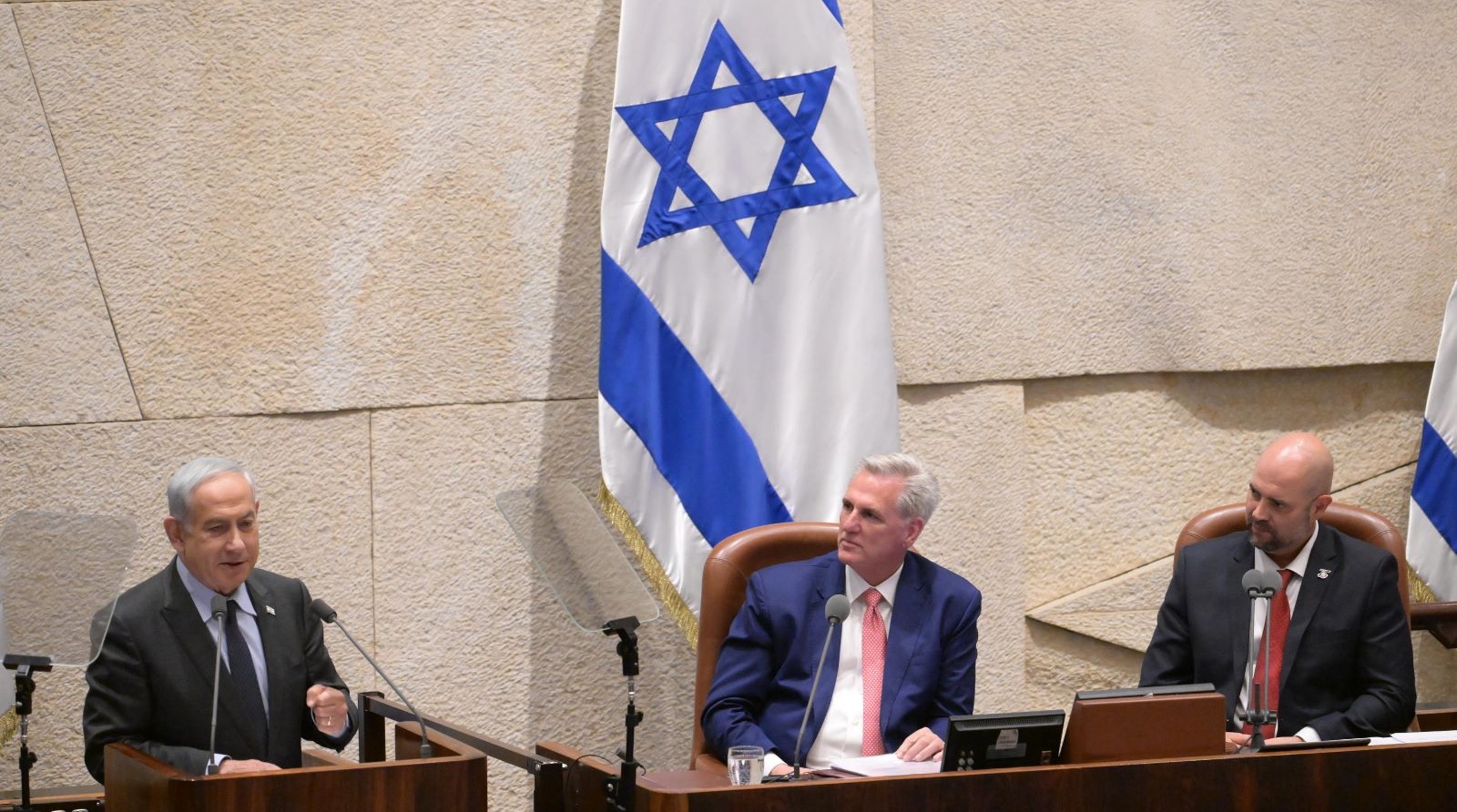(JTA) — In a landmark speech to Israel’s parliament, the Knesset, on Monday, U.S. House Speaker Kevin McCarthy didn’t mention the judicial reform legislation dividing Israel, instead focusing on what he said was the significant threat from business dealings with China.
McCarthy’s speech and comments took place on the opening day of the Knesset’s summer session, days after the country celebrated its 75th birthday and during considerable strife in the country over Israeli Prime Minister Benjamin Netanyahu’s far-reaching proposals to weaken Israel’s court system. Netanyahu had suspended the advance of the reforms amid sweeping protests against them, in a pause that was due to end on Monday.
During a press conference after his speech, McCarthy offered a nod toward critics of the proposed legislation who seek to preserve the courts’ independence.
“Israel is their own nation. Israel can decide what they want to do,” McCarthy said. “But I mean, having democracy — you want to have a check and balance, you want to have separation of powers.”
The speech by McCarthy, a Republican, came as he leads a bipartisan delegation to the country days after it celebrated its 75th Independence Day. It also came amid tensions between Netanyahu and Biden, a Democrat, who has not yet invited Netanyahu to the White House.
In an interview with the Israeli newspaper Israel Hayom ahead of the speech, McCarthy chastised Biden for not inviting Netanyahu and said he would invite the prime minister to Washington if Biden did not.
But McCarthy was not at all partisan during his speech or afterwards, pointedly bringing the delegation of Democrats and Republicans into every photo-op. McCarthy spent more time discussing Chinese-Israeli relations, bringing tensions between Israel and the United States on the issue into public view.
“I strongly encourage Israel to further strengthen its oversight of foreign investment, particularly Chinese investment, building on the steps that you first took in 2019,” McCarthy said in his speech Monday, referring to an investment review board Israel launched that year under pressure from the Trump administration. “If we cooperate, then I’m confident we will meet the challenge and ensure a brighter future for both of our nations.”
McCarthy’s speech, the second ever by a U.S. House speaker to the Knesset, contained few surprises. He noted that Israeli pilots trained in his hometown of Bakersfield, California, before the country’s 1948 War of Independence. And he presented the Knesset with a copy of a House resolution passed overwhelmingly last week marking Israel’s 75th birthday. References to the establishment of a Palestinian state, which Netanyahu’s government opposes, were stripped out of the resolution, spurring criticism from Democrats who nonetheless voted for it.
The speaker also recommitted to fully funding current levels of defense assistance to Israel, assuaging concerns that across-the-board spending cuts passed by the House last week could affect the country.
“As long as I am speaker, America will continue to support full funding for security assistance in Israel,” he said.
And McCarthy also rejected attempts to isolate or boycott Israel, promoted peace with Israel’s Arab neighbors and called out shared rivals and enemies, especially Iran.
“We must always remain resolute in our commitment that Iran will never acquire a nuclear weapon,” McCarthy said.
Netanyahu, speaking before McCarthy, also noted the Iran threat and took care to say it was a concern shared by both Republicans and Democrats.
“The first and most urgent challenge is the joint effort by Israel and the U.S. to prevent Iran from obtaining nuclear weapons,” he said. Then, referring to the Israel Defense Forces, he added, “The IDF and the U.S. Armed Forces recently completed the largest military exercise in the history of Israel and for this I would like to thank the Biden administration.”
Another issue of bipartisan concern is Israel’s growing relationship to China. McCarthy inserted his warning about Israeli-Chinese ties into the portion of his speech praising U.S.-Israel technological cooperation, an endeavor that Israel considers critical to its security infrastructure.
Israel and Netanyahu particularly have cultivated ties with China and its massive market to advance sales of Israeli technology, and to invite Chinese investment in Israeli sectors. Netanyahu has in the past highlighted his efforts to bring China and Israel into each other’s orbit.
Those efforts have appalled leaders of both parties. One of the areas of consistency between the Trump and Biden administration has been a policy of constraining Chinese influence outside of Asia, as the country seeks inroads into Africa, the Middle East and Latin America. China concerns have been exacerbated in the United States in recent months by perceptions that China is cozying up to Russia in its war against Ukraine, and fears that China may be planning a similar action against Taiwan.
“We’ve seen successes of technological cooperation in so many areas,” McCarthy said. “Today, however, our innovation is at risk from a new threat: The Chinese Communist Party. While the CCP may disguise itself as promoters of innovation, in truth they act like thieves. We must not allow them to steal our technology.”
JTA has documented Jewish history in real-time for over a century. Keep our journalism strong by joining us in supporting independent, award-winning reporting.






